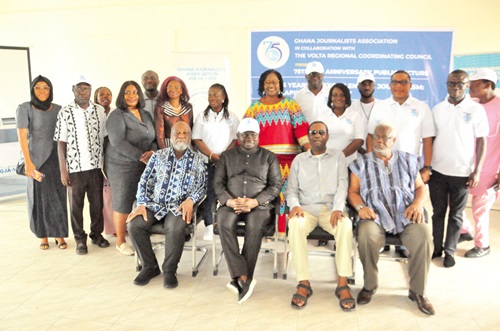
Galamsey threat to future generation — Cameron Duodu
The future generation of Ghanaians will only become survivors and not inheritors because of unmitigated contamination of the rivers and lands by 'galamsey' operators.
This was the concern of globally acclaimed journalist, Cameron Duodu, at the 75th Anniversary Public Lecture of the Ghana Journalists Association (GJA) in Ho yesterday.
The celebrated columnist urged the GJA to renew its stance to fiercely fight the injustice of the recklessness and excessive destruction of the environment by lawless, unpatriotic and greedy individuals in society and project a better future for the country.
He entreated journalists to lead Ghanaians to “create the future in the present,” saying that it invariably included maintaining the dignity of the environment without the excessive contamination of the country’s natural resources.
“How can our children and grandchildren live if we pollute the water bodies and destroy the earth?” he sought to know.
Theme
In his presentation on the theme: “75 years of Excellence in Journalism – Honouring the Past, Embracing the Present and Shaping the Future,” Mr Duodu insisted that there was no need for GJA in particular, and the media in general, to look on in silence when some individuals were toying with the nation’s future.
Speaking on the same topic, seasoned communications lecturer, Professor Kwame Karikari, pointed out that journalism was an activity conducted in the public space, for the public and in the service of public interest, including the crusade to preserve the environment.
To pursue that objective effectively, he called on the GJA to strengthen the structures for promoting the welfare and professional interests of its members, which he said were now non-existent or weak.
“Considering how rapidly and complex media is developing, the organisation may consider establishing structures or units staffed by full-time professionals who lead programmes for legal services, welfare issues, and labour rights, including improvement in wage scales and professional counselling,” Professor Karikari added.
He said the growing threats to journalists’ rights and growing decline in public trust must provoke the professional association to revisit the idea of establishing systems and structures for self-regulation.
“These systems shall monitor and ensure compliance with ethical codes and principles and provide ombudsman services to the public,” he explained.
High standards
A seasoned media consultant, Dr Akorfa Segbefia, who was the first to present a paper on the theme, recalled that the GJA was formed in the absence of a plurality of media establishments.
Now, he said, the GJA was even more relevant primarily due to the exponential expansion of the media landscape where news travelled at a breakneck speed and more professionalism and ethics were demanded from journalists.
He said in the wake of the proliferation of social media and Artificial Intelligence, traditional media could thrive to greater heights in an atmosphere of competition with high standards of professionalism and multitasking.
Dr Segbefia entreated the GJA to maintain a united front all the time and said: “As one, we can be each other’s keeper. As one, we can be assured that anyone who touches a journalist would be seen to have touched GJA”.
“Journalists must not lose their guard to speak truth to power, but being bold must not make the journalist reckless,” he added.
